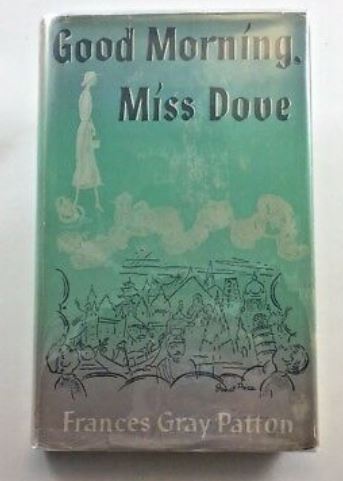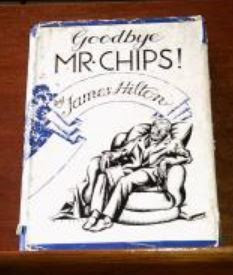Role Models: Miss Dove & Mr. Chips -- Garbo
Last week I took a break from my books-to-movies series, but as of now I'm back doing posts with that theme. Today, we look at two inspirational teachers from novels, each of whom became a role model on film.
First, geography teacher Miss Dove. Her creator, Frances Gray (Lilly) Patton, wrote plays while a student at the University of North Carolina, then married a Duke University English professor named Lewis Patton.
Patton was a dutiful "faculty wife" and mother of three. In the 1940s, she took up the creative life again and switched from the theatre work she'd done in college to writing short stories. Patton won a prize from the Kenyon Review for her story "A Piece of Bread," which wan included in the 1945 anthology of O. Henry Prize winners. From there, Patton's fiction appeared regularly in The New Yorker, as well as in Collier's. Harper's, and McCalls. One of her stories, "The Terrible Miss Dove," became the novel Good Morning Miss Dove, published in 1954. The book became a bestseller, a Book of the Month, and a Reader's Digest selection. A New York Times reviewer compared Good Morning Miss Dove to Mary Poppins, Life With Father, and Goodbye Mr Chips.
James Hilton, author of Goodbye Mr Chips, was an English writer whose previous book, Lost Horizon, was also a bestseller which became a film. The book Lost Horizon won the prestigious British Hawthornden Prize (other winners included I, Claudius and The Power and the Glory) and Lost Horizon became the first offering from the Pocket Books series of inexpensive paperbacks. The publication of Goodbye Mr Chips followed closely on the heels of Lost Horizon.
Hilton's character Mr. Chipping was modeled on both Hilton's father (a school headmaster) and the headmaster of The Leys School, which Hilton had attended. The manuscript of Goodbye Mr Chips was actually not full novel length, but closer to a novella, and it had been printed in The Atlantic before coming out as a book in first the US, then Britain.
"Goodbye, Mr. Chips" is on many "favorite movie" lists. Just as we all have an actress who is Miss Marple to us, no matter how many have played the role, so we each have our favorite actor in the role of the beloved British public-school Latin teacher Mr Chipping.
There have been three versions of "Goodbye, Mr. Chips," including a 2002 movie I haven't seen. The role of Mr. Chipping was played in the original version by Robert Donat in 1934. Peter O'Toole was appealing three decades later in the remake of "Goodbye Mr. Chips," but when I think of the character, I personally see Robert Donat's face.
Both Miss Dove and Mr. Chips came from popular fiction, but it was at the movie theater that most Americans came to know them. Some of Mr. Chipping's students left school to fight in the First World War, but real life one generation later, in the turbulent Europe of the 1930s, surely made the kindly-but-firm instructor at the stable, orderly Brookfield School so loved by movie-goers.
1940s celebrity Alexander Woollcott, as "The Town Crier," introduces the trailer for the 1939 version:
After this film, Hilton -- who'd moved to Hollywood -- wrote the screenplay (based on the book by Jan Struther) for the morale-boosting "Mrs. Miniver." Greer Garson, who'd played the love interest in "Chips" was the brave housewife in the later film:
(The video site Daily Motion has "Mrs. Miniver" for free, in two parts, and you can watch it here.)
After the successes of bestsellers Lost Horizon and Goodbye Mr Chips, Hilton continued to write fiction. He appeared on the radio, most often as host for radio's "Hallmark Playhouse" in the 1940s and early 1950s. Hilton also offered his thoughts on current literature. Here he is on the NBC program "University Theatre," talking about George Orwell's just-released book 1984.
During his life, James Hilton was married and divorced twice. He died in his fifties from a smoking-related illness. He was lovingly nursed at the end of his life by his first wife Alice.
Twenty years after the publication of Goodbye Mr Chips, Frances Gray Patton's story of Miss Dove, fighting a brave private battle while also caring for her small town (filled with her former pupils) was widely accepted, both in book and film form. This sentimental tale seemed to be the antidote for many moviegoers, in particular, to the wave of cynical postwar films which appeared in the aftermath of film noir.
Here's something fun: This website takes a look at the film version of "Good Morning, Miss Dove" in a well-written article filled with enjoyable film stills and publicity shots, like this one:
 |
| Garbo |




Comments
Post a Comment